 My students and I just had our very first print-and-play experience. Last weekend, I ran into Jacob Geib-Rosch at an Unpub Mini event, where game store customers were able to test prototypes of unpublished games. Sadly, I didn't get to play Jake's game that night, but I did get his business card and request a print-and-play so that we could try it out with our game club. Red Phoenix of the Alchemists is eye-catching and has a fun theme that Jake is obviously passionate about. In the game, you and up to four friends are alchemists who are all seeking to transform common ingredients into gold. To do so, you purchase basic ingredients from a market and use them to perform experiments. If an experiment is successful, you create a more powerful substance, as well as a formula that allows you to continue producing it. This, in turn, enables you to perform higher-level (but also riskier) experiments. A failure in the lab can be pretty devastating as you try to build an engine that will get you to gold, but that's only fair in the wild world of alchemy. If your experiment goes awry, you lose all of those ingredients you bought, plus you can do damage to yourself and to your fellow alchemists. A "catastrophic failure" can even summon monsters who attack you! While playing, we imagined that we all worked in the same lab and that we were constantly trying to peek at each other's notes, form alliances, or sabotage each other. Red Phoenix definitely encourages this, because items that you create throughout the game can be used on any monster or player. A bottle of acid or two may have been flung across the work tables... 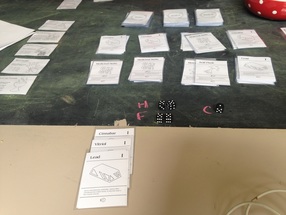 We used dice and my chalkboard tables to track health and coins. We used dice and my chalkboard tables to track health and coins. Even though we were playing a less-fancy, low-ink version of the game, the art and flavor text were engaging. We were all disappointed to learn that cinnabar does not, in fact, taste like cinnamon. One of the students was very excited when his experiment yielded "Alchemist's Hooch," even though we told him he couldn't use it until he was over 21. And based on the prototype I saw last weekend, the full-color cards look beautiful! I am excited to see what this game will look like in its complete form, with coins and health tokens and everything. The best part about getting to try Red Phoenix of the Alchemists as a print-and-play was how special it made my students feel. Most of them had never thought about how games are tested before they get published. Getting to try out a game that few people have ever gotten to see really excited them. They came up with great feedback for me to email to Jake, and they paid much closer attention to the art and flavor text than they usually do because they knew it was a draft. I'm truly grateful to Jake for letting us give his game a test drive, not only because it was fun, but because it exposed my students to something new and exciting. Overall, Red Phoenix of the Alchemists works well—it's a fun game with a great theme, and it creates an atmosphere of tension and curiosity among the players. I truly hope it gets published.
0 Comments
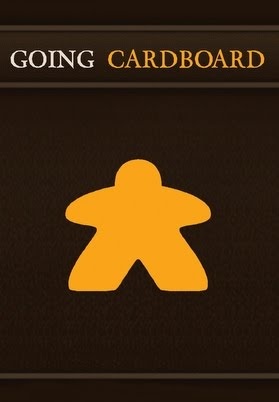 I took some time this afternoon to watch Going Cardboard, a 2012 documentary about the rising popularity of German board games in the United States—at least, I think that's what it was about. And that is the problem with this documentary. The subject of Going Cardboard is obviously fascinating to me, because it's about board games. I really enjoyed getting to see footage from Essen, and I especially loved seeing interviews with people behind the games I enjoy every day. There were some cool interviews, too. I had no idea that a guy named Zev is behind Z-Man games. I regularly see Donald Vaccarino's name on my Dominion box, but I had no idea what he looked like. (Actually, the only designer whose picture I could identify is Friedemann Friese—it's hard to miss green hair.) It was fun to hear board game publishers speak for themselves, and to see snippets of a story about a man who wanted to publish his game, Huang Di, but just couldn't seem to catch a break. As you can see, however, there was a lot going on in this documentary. It utterly lacked focus. The sound and picture quality were cheap, but it was a low budget doc, so I can forgive that. I was not, however, impressed by the nonexistent main storyline. Was this doc about American vs. German games? About the Spiel des Jahres? About the game publishing industry in general? It tried to be about all of these things, and ended up being about none of them. This makes me sad, because each of those subjects individually would have been fascinating. The palpable enthusiasm of the people interviewed for the doc was infectious, so the raw material was pretty good. But the final product ended up being lackluster. If you are a board gaming megafan, you will enjoy this film just because. But I probably wouldn't show this to a non-gamer to help them understand what I do with my spare time, because there isn't a strong enough hook to draw them in.  No. No. Whenever I play a new board game, I think about whether my friends and students would also enjoy it. Even though I'm primarily a solo gamer, I love to talk about games, and most of my social gatherings focus on playing games. At work, my best times with students also revolve around games. This means that even if I'm playing alone, I can't bring myself to engage with certain board game themes. Everyone has themes that they just don't like. Even though it's supposed to be amazing, I'm not even considering Kingdom Death: Monster. Not only is the cost prohibitive, but I think its depictions of women are gross. There are also themes that I am more than happy to explore, even though they might make other people uncomfortable. I have yet to play Letters from Whitechapel, but I don't think I would mind roleplaying as Jack the Ripper on the run from the police. I certainly enjoy a round or two of Cards Against Humanity, and I have slain many enemies across many universes. I get a real kick out of forcing my children into arranged marriages in Legacy: The Testament of Duke de Crecy. And in the world of video games... let's just say I acquired all of the Daedric artifacts in Skyrim. But there is one theme in games I object to deeply, and that is European colonialism, especially the exploitation of slaves. A game like Settlers of Catan, which was meant to evoke the Vikings' exploration of Iceland, is a game in which the settlers take over land that is untouched and that does not already belong to somebody else. I enjoy Catan, and I choose to interpret the fact that the robber in the game is represented by a black pawn as an oversight. But there is no way I am ever going to invest time and money in a game like Archipelago or Puerto Rico, both of which feature slavery—overtly or not—as a game mechanic. In Puerto Rico, you use tokens that represent dark brown "colonists" who do your bidding. Some people will argue that the game is abstract, or they will make convoluted historical arguments to downplay the issue. Because Puerto Rico is more about role selection mechanics than about Puerto Rican history, some people find it easy to overlook all of this and "just play the game." But to me, there is something inherently wrong about moving a lot of little brown people off of your boats and into your factories/fields/whatever. 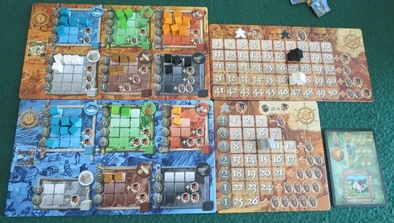 Note that the colony stability board (top right) is literally a black meeple chasing down a white meeple. Image taken from thurot.com. Note that the colony stability board (top right) is literally a black meeple chasing down a white meeple. Image taken from thurot.com. Archipelago is a bit more self-aware than Puerto Rico, as it's clear from the outset that you are foreigners who are taking land and resources from local people—and also that you are turning local people into a resource. (There is even a "slavery" card.) Within the game, the people you are exploiting will rebel unless you find ways to keep them happy. If a rebellion occurs, everyone loses. Because of its overt recognition of slavery as a real thing in the game—one that can have consequences for players--Archipelago often gets a pass. But for me, "consequences" aren't enough. It's still not acceptable to roleplay as a colonist who is actively suppressing native people. The reason this theme is a no-go for me, when I am willing to tolerate a lot of other things, is that the effects of European colonialism still have a very real, very negative effect on actual people in the modern world. I can't enjoy myself while making light of something that is both morally repugnant and still massively impactful. That isn't pretending to be a little bit naughty. That's implicitly being okay with white supremacy in a world where white supremacy is actively damaging people's lives. One comment I've noticed repeatedly on forums and in reviews is that even though someone might be willing to play a game like Puerto Rico or Archipelago, "I probably wouldn't play it with my black friends." The students at my school are overwhelmingly Black and Hispanic, and there is no way on this earth I would ever ask them to play Puerto Rico or Archipelago with me. And if I wouldn't play a game like that with them, why would I play it at all? The answer: I won't. This year, I'm going to have a very exciting summer: I'm spending six weeks in Rome! I'll primarily be hanging out with other Latin teachers and studying the history and archaeology of the eternal city. But if you know me, you know I cannot possibly go six weeks without wanting to play a board game. You will also know, however, that I am an obsessively light packer. The only reason I'm checking a bag on this trip is so that I can transport copious amounts of sunscreen. How will I manage to game while on the road? Fortunately, Board Game Geek has my back with this thread about game stores in Rome. Additionally, I am planning to pack one or two small games, plus an iPad loaded with board game apps. I'm not entirely certain which games will make the cut, but I think that I will bring The Game because it is a fun solitaire that can convert to a co-op. I'm also considering bringing one of the games set in the Oniverse, because they offer lots of play without taking up a lot of room in a bag. I already keep copies of Hive and Love Letter in my backpack, so I will just leave them there. Plus, if I am an extra-efficient packer, I can bring Ivanhoe and hope that my roommates are interested in playing. Ivanhoe is a fantastic gateway game for my high school students, and fellow teachers tend to like it, too. Maybe it'll work its magic again and help me make some new friends in my summer class!
My other strategy is to cram a bunch of board game apps onto my iPad. I have app versions of Carcassonne, Ticket to Ride, Catan, Splendor, and Ascension... and hey, maybe I "need" a few more as "preparation" for my journey. If you have any suggestions for games that I should bring/download, I want to hear them. Feel free to add your thoughts in the comments! 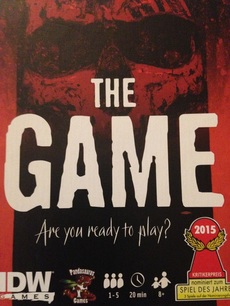 You would think that, when naming a new game, you would at least choose a title that is easy to Google. That clearly did not occur to whoever localized The Game: Are You Ready to Play The Game? Not only is the name pretty unwieldy, but its "badass" skull theme is goofy and has nothing to do with the actual gameplay. That said, the fact of the matter is that this game is addictive. Seriously, I can't quit playing it. The Game's German name is Spiel...so lange du kannst! This translates to "Play... as long as you can!" And believe me, you will. There is a reason this game was a 2015 Spiel des Jahres nominee. The rules of The Game are simple, and so is its overall concept. There are 102 cards in the game. Four them are used to start off the stacks on which the rest of the cards are played. Two of the stacks ascend from 1 to 99, while the other two descend from 100 to 2. The remaining cards are the numbers 2–98. Each player draws a starting hand of 6–8 cards, depending on the number of players (The Game is a co-op that can accommodate 1–5). Every turn, each player must play at least two of his or her cards before drawing back up to the hand limit. If you can lay every single card on a pile, you win. If you don't win—this will usually be the case—you judge yourself by how few cards were still left at the end. If there are fewer than ten cards remaining, you had a pretty good run. To add some strategic depth to the game, there is also the "backwards" rule. This means that you can lay a card on an ascending pile that is 10 less than the top card on the pile (e.g. a 29 to a 19 on a 1 to 99 pile), or a card on a descending pile that is 10 greater than the top card on the pile (e.g. a 79 to an 89 on the 100 to 2 pile). This helps you to buy yourself some more breathing room as you try to get rid of more cards. Although it is not a perfect game—luck has a lot to do with your final results--The Game is highly addictive and remarkably tense for a game that is about stacking some number cards. I have played it solo and in a group of three, and it was a lot of fun in both cases. My friends kept saying, "Let's try that one more time. I'm sure we can do better this time!" Sometimes I pull it out as a warmup for a longer gaming session, but end up spending an hour just playing The Game. I actually told my boyfriend that it was like an analog cell phone game because it is quick and you'll play over and over again. Then I checked the iOS Store: There IS an app! And, rather than tone down the whole skull theme, it appears that the app developers have doubled down. Have a listen, because that voiceover is AMAZING. I start laughing every time I hear it. I keep thinking I'm actually about to play Mortal Kombat. If you're looking for something deep and complicated, look elsewhere. But if you want a simple, inexpensive card game with a lot of replayability, I highly recommend The Game. I'm honestly glad it is in my collection, even with the skull art and ridiculous name.  What it feels like to play chess with Pops. (Image taken from WSJ.) What it feels like to play chess with Pops. (Image taken from WSJ.) One of my fellow teachers is currently running a chess tournament at our school. My planning period coincides with all three lunches, and I don't share a classroom. So when there aren't actual classes going on, my room fills up with teenagers conducting very intense chess matches, even if they are no longer in the tournament. Most of the time, watching kids learn to play chess is a delight. I am not particularly good at chess myself, but I smile every time I spot someone who has checked out a chess strategy book from the library or who is trying to watch YouTube chess tips on a cell phone. (Hey, it's better than Snapchat!) But while chess may be all games, it's not always all fun. Several of my lunchtime players are new to the game, which means they get crushed by more experienced opponents. Last week, one of the novices was frustrated after a relative veteran gleefully destroyed him, to the point where he needed to step out for a bit. When he returned, one of the other experienced players made a huge mistake: He challenged the newbie to a match for fun, and then let him win. When called on it, he said, "Well I didn't think you'd be able to tell!" Ouch. It's a topic we all have opinions about: Should you ever "let" someone else win a game? If so, under what circumstances? There was a spate of news stories around Christmas 2015 that encouraged parents not to let their kids win at board games. And in an era where every kid who plays a team sport gets a participation trophy, it does seem like our society is in need of more healthy competition. It's interesting to work through this issue with chess, because it stirs up memories from my own childhood. When I was still in elementary school, I spent a summer with my grandparents and played chess with my grandfather every single night. He had no mercy. I felt so much despair during that month because Pops would just decimate me and I could never quite figure out why. (He's not much of a talker.) I still get anxious about playing chess because it takes me back to night after night of crushing losses with no discernible evidence of progress. I only beat Pops one time, on the second to last night. I'm pretty sure I just got lucky, but victory was sweet. I'm glad he never let me win. Still, since that summer, I have barely played any chess at all, and just thinking about it gets me all worked up. Perhaps the best solution is the middle way: Play to win, but not to destroy. Letting someone win devalues the game and shows disrespect for your opponent. But when playing a friendly game, especially one that includes new players, keep it friendly. There is no need for ultra-competitive craziness. Try a new mechanic. Conduct a bold experiment. Test the limits of the game. You can't always do that stuff when you're out for blood, so take the chance while you're supposed to just be having fun. Also, play in a way that keeps everyone in the game for as long as possible. (There are obvious exceptions to this, depending on the game you're playing.) No one, even someone who is just learning a game, wants to feel like they have no chance at all. I have always hated to lose, and I probably always will. But these days, I derive most of my enjoyment from feeling that I have put up a good fight and played well. Winning is fun, but progress is satisfying. I might still enjoy chess if I had gotten a better understanding of what I could do to improve, even after so many losses. Of course, if you are a highly competitive person who wants to see the enemy driven before you, that is fine—as long as your fellow players experience similar levels of bloodlust. And if you're primarily a solo player like me, you have no one to blame but yourself when Friday kicks your butt... again. :( 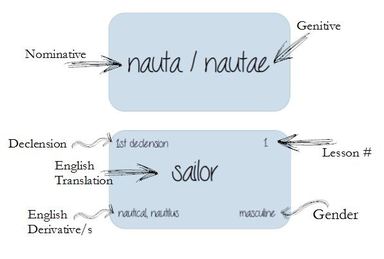 This flashcard from sixmoresummers.com makes my inner nerd sing with joy... but my students will not study it. This flashcard from sixmoresummers.com makes my inner nerd sing with joy... but my students will not study it. Summer is coming. As my teaching year comes to an end, I can't help thinking about what I want to improve for next year. This year was my first as a Latin teacher, and I started my program from scratch. As a result, I think I taught a little too traditionally this year, and there are some major changes I would like to make as I get a new crop of Latin I students. The biggest change I'd like to make is a switch to more spoken Latin/comprehensible input. I'm not ready for 100% Latin—I learned the language in the traditional grammar-heavy way—but next year I want at least one third of every class period to be conducted entirely in the Latin language. To help my students absorb vocabulary and grammar, I want to play more games with them. The mainstream classroom games we played this year—vocab bingo, Kahoot, etc.—are not what I mean by this. Overt review games can be helpful, but the kids still "know they are reviewing" and may or may not care. Instead, I would like to spend some time this summer making bootleg Latin versions of games that they already know and will play. Here are some of the ideas that I had, and I would more than welcome any suggestions in the comments: 1. Latin Clue: A Latin version of Clue with Roman names, rooms, and objects would be an awesome way to teach my students several concepts at once, without them fully realizing that I had an evil plan to teach them things. Not only would they learn the rooms of the house, but they would learn how to use specific grammatical constructions (in the room, with the object) outside of direct instruction/practice sentences. Direct instruction sometimes (...usually) does not stick. 2. Latin Guess Who: This seems like a great way for my students to "naturally pick up" information about physical appearance and the body while also internalizing the format of questions in Latin. I would obviously scaffold this by offering them vocab helps that would let them play entirely in Latin—and while playing, the students might eventually memorize the words for hat, hair (+ colors), man, woman, fat, thin, etc. without me having to do a lot of traditional drilling. 3. Latin Uno: I guarantee my students would know numbers 1–9, Roman numerals, and words for "pick up," "skip," and "reverse" in no time. 4. Any playing card game: I would love to find or make a playing card deck with Roman numerals instead of regular numbers. The face cards could be labeled rex (king), regina (queen), and eques (knight, in place of jack). With fairly minimal vocab lists, I could have the students playing games like Go Fish, Old Maid, and War. 5. Latin Apples to Apples: This game would be about vocabulary exposure. I could use our actual vocab from class with some extensions, and have two levels of the game—one with English helps on it, one without. Some of the noun cards could be historical figures or Greco-Roman gods the students had learned about, so that you could get funny pairings like "faithful" with "Jupiter." (For those whose mythology is rusty, Zeus/Jupiter was a notoriously unfaithful husband.) These games don't have to be fancy—I'm planning to get a personal laminator for about $30 on Amazon and abuse our school's color printer during teacher workdays in August. But I think that playing "real" games that just happen to be in Latin might help my students internalize and gain confidence in the language. If you have any suggestions, I am very open to hearing them! 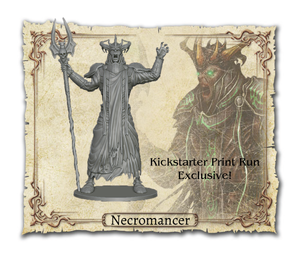 Get ready to go down, Necromancer! Get ready to go down, Necromancer! The first time the Darkest Night Kickstarter came around, I eagerly backed it only to be cruelly disappointed a day later. Victory Point Games had canceled the campaign and promised a relaunch the following week. I admit I was skeptical—the whole thing seemed like one big trainwreck. I am happy to say, however, that it looks like I was wrong. The Darkest Night campaign relaunched on May 12, this time asking for only $90,000 (originally the amount had been $120,000) and accompanied by stretch goals that actually add new cards and mechanics to the game. Full funding has already been reached, and the campaign is moving along nicely towards its first stretch goal. By next March or so, I should have something that I really wanted: a copy of Darkest Night with all of the original expansions, all in one big box. On top of that, there will be two new expansions. Plus, I went for a sweet set of miniatures. I am once again feeling excited about Darkest Night! There will be a lot of gaming to do in the not-too-distant future. 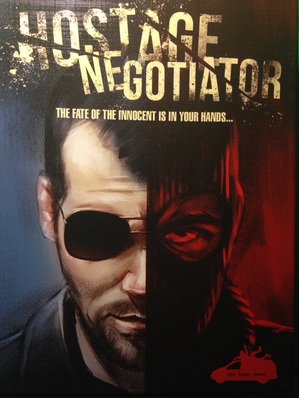 My job is stressful, but at least my aviator sunglasses make me look cool. My job is stressful, but at least my aviator sunglasses make me look cool. Although solo gaming is growing in popularity, not too many board games are made exclusively for solo play. One exception is Hostage Negotiator, a solitaire game whose successful funding through Kickstarter revealed that demand really is high enough to support the publication of one-player board games. Your role in Hostage Negotiator is exactly what you would expect: You must free hostages from one of three abductors (more are added through expansion packs). If you neutralize the abductor and free more than half of the hostages, you win. If you lose more than half of the hostages, or if the abductor escapes, you are defeated. This game is generally billed as a dice chucker, but it incorporates several interesting strategic elements, including deckbuilding. To make progress with an abductor (or not), you engage in several "conversations," during which you play conversation cards. Your starting hand consists of six zero-cost conversation cards that you must use to improve your situation. Depending on how you deploy the cards, you can reduce the abductor's threat level—thus lowering the likelihood of a hostage's death and giving you more dice to roll—and/or win conversation points, which are used to purchase more useful cards for the next turn. Once you have figured out some of an abductor's demands, you also have the option of conceding them, which can provide short-term benefits but also nasty long-term consequences. Each round, you must draw a card from the terror deck, which further complicates your situation and pushes you closer to a pivotal event that will bring the game to an end. The dice rolling aspect of the game might drive some players crazy. It is entirely possible that all of your rolls will be terrible and that you will lose the game as a result. But I actually found the randomness to be a lot of fun because it was easy for me to imagine myself on the phone with a panicky, unstable hostage abductor whose actions were becoming increasingly erratic. Also, as I played the game more, I developed strategies that made me feel like I had a chance at success, so it was satisfying to fight on even if I ultimately lost. Hostage Negotiator is a highly replayable game, with a lot of variability built into it. Not only are there slightly different rules for each abductor, but the randomization of terror cards and abductor demands creates a slightly different scenario each time you play. If you pick up more abductor packs, you can also try your skills against abductors with different special rules and abilities. 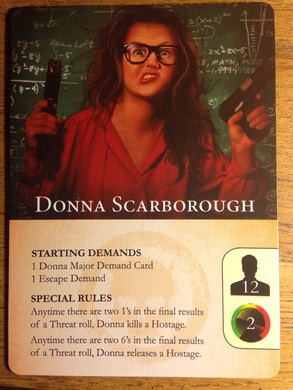 Donna, I know summer break can't come fast enough, but you need to cool it. Donna, I know summer break can't come fast enough, but you need to cool it. Although not all of the abductors are compelling, Hostage Negotiator does a good job coming up with interesting mechanics that are connected with the abductors' identities and personal situations. This isn't immediately clear in the base game. The recommended first abductor for beginners, Arkayne Massua, is a generic terrorist type who wants weapons, money, etc. But the others, Edward and Donna, provide much more interesting scenarios. Donna, in particular, is a favorite of mine because she is a teacher who has been denied tenure, and who has taken several of her students hostage in a desperate bid for professional security and affirmation. I always wonder: How old are her students? Did she have the nerve to threaten her most brilliant and delightful pupils, or did she work in a school where everyone treated her like crap? How would it feel to be a kid in that class, proud that you did your homework assignment for once and then coming to the realization that this was no normal school day? Some of Donna's demands are darkly hilarious, and it really adds to the joy of playing the game. Hostage Negotiator is at its best when it helps you tell yourself a story. In the expansion packs, some of the new abductors are generic criminal types who just have cool added mechanics. But one is so sympathetic that his hostages get Stockholm Syndrome, which makes freeing them more interesting and challenging. While all of the different abductors make for fun and clever puzzles, my favorite experiences with this game come from testing myself against the ones with the most nuance. They make the conversations, hostage meeples, and terror events really come alive. If you enjoy solo games, I would say that Hostage Negotiator is a must-have for your collection. It manages to be interesting and tense, play after play. And it also has the potential to provide you with an imaginative experience that takes you beyond solving a puzzle and immerses you in a high-stakes adventure.  Image taken from Tech Girl (http://techgirl.co.za/) Image taken from Tech Girl (http://techgirl.co.za/) These days, when people think about the topic of women and gaming, they tend to think of GamerGate. Fortunately, that blight on our social landscape seems to have died down at last, but it happened, and it was appalling. Most of the harassment women in gaming face, however, is nothing like what Zoe Quinn, Anita Sarkeesian, or Brianna Wu have endured. Board gaming, especially, still seems relatively unaffected by controversy over representation of women within the hobby. People occasionally express disgust with games like Barbarossa, a game about sexy anime Nazi girls. But for the most part, board game designers remain relatively immune from backlash over representation of women (or lack thereof). In some ways, the lack of overt controversy about these issues in board gaming leads to a more frustrating kind of hostility—the kind that you feel, and that you know for sure is real, but that you can't actually prove. I have been very lucky so far. I have never been seriously harassed. It probably helps that I don't typically game online. But that doesn't mean I haven't faced mild forms of prejudice from men at my FLGS (friendly local game store). My boyfriend and I regularly shop at game stores together, and we frequently face the problem of male employees who talk exclusively to him, even if I am the one who is buying the game. This has also happened when I buy video games at GameStop—you'd be amazed how many employees assume that copy of Far Cry 4 is a gift for my boyfriend instead of myself. The thing that really drives me up the wall, though, is the constant assumption by game store employees that I do not know what I'm doing or what I'm talking about. I bought a copy of Codenames a few weeks ago, plus some sleeves for my Lord of the Rings LCG cards. The checkout guy looked at me like I was a complete idiot and said, "You realize those sleeves aren't going to fit the little cards in Codenames, right?" I raised an eyebrow at him and said I was quite aware of that, thank you. He started to backtrack and offered up a lame excuse: "Oh, well, I always check when people are buying sleeves." I know his is untrue, because he doesn't check when my boyfriend buys them. A different guy at the same store once insisted on looking up a game I wanted on Google to make sure I had given the correct name of the game before he tried searching for it in the store's database. The game was Darkest Night (before I heard about the reprint and decided to wait). Are you freaking kidding me? Again, when I gave him the "WTF" look, he backtracked and said, "Um, I check with everyone, our search engine is really finicky." Really? These minor offenses really are minor. They aren't the sort of thing you complain to the manager about. It can even be hard to explain what made you so angry to someone who wasn't there. But that doesn't change the fact that they happen constantly, that they are annoying, and that they serve as a powerful reminder: Women aren't always viewed as "legitimate" gamers in the same way that men are. That's something I hope will eventually change. |
AuthorMy name is Liz Davidson, and I play solo board games. A lot of solo board games... Archives
August 2021
Categories
All
|
 RSS Feed
RSS Feed